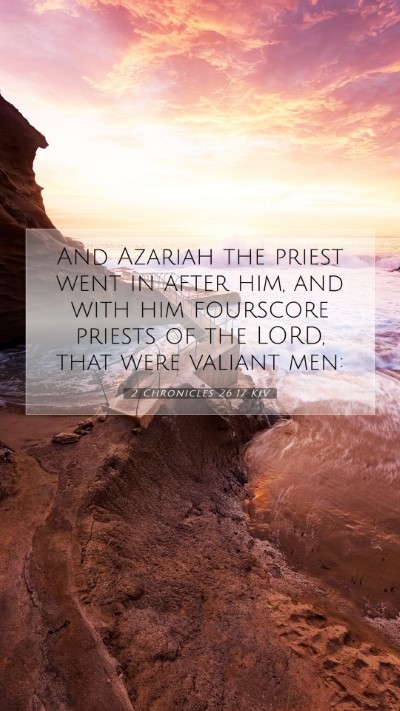Understanding 2 Chronicles 26:17
Verse Reference: 2 Chronicles 26:17
Verse Text: "But when he was strong, his heart was lifted up to his destruction: for he transgressed against the LORD his God, and went into the temple of the LORD to burn incense upon the altar of incense."
Overview of the Verse
This verse captures a significant and cautionary moment in the life of King Uzziah, illustrating the dangers of pride and the consequences of straying from God's commandments. The narrative reveals not only Uzziah's initial strength and success but also the ensuing downfall due to his arrogance and disobedience.
Bible Verse Meanings
The essence of 2 Chronicles 26:17 lies in its warning against the perils of pride and self-exaltation. The verse indicates how Uzziah, who had been blessed by God with great successes, allowed his achievements to inflate his ego. As per Matthew Henry, this particular error serves as a grave reminder to believers of how vulnerability often arises when one is most secure.
Insights from Public Domain Commentaries
- Matthew Henry: He highlights that Uzziah's pride led him to offer incense in a way that was not prescribed by the law, reflecting the notion that religious practices must adhere strictly to God's directions. Uzziah's transgression illustrates a grave overreach, examining the balance between personal success and obedience to divine authority.
- Adam Clarke: Clarke comments on the arrogance of Uzziah as indicative of a broader human folly; the more successful one becomes, the more susceptible they might be to pride. Clarke emphasizes the significance of humility, arguing that spiritual leaders must remain grounded and vigilant against the temptation of self-importance.
- Albert Barnes: Barnes interprets Uzziah's actions as a direct affront to the role of the priests and proper worship. He points out that Uzziah’s intrusion into the priestly duty of burning incense symbolizes a rebellion not just against the law, but against God Himself, marking a pivotal turn that leads to divine judgment.
Bible Verse Interpretations
In considering the broader theological implications, this verse invites readers to explore the importance of humility before God. Uzziah’s rise and fall exemplify the cycle of pride leading to a fall, a recurring theme throughout Scripture.
Key Interpretations:
- Spiritual Responsibility: Leaders and followers alike carry the weight of accountability before God. Uzziah's disobedience serves as a call to action for those in leadership roles.
- The Nature of Sin: Uzziah's sin is rooted in his heart; it highlights that sin often begins with internal attitudes leading to external actions. Understanding this can help in recognizing how pride operates within us.
- God’s Grace and Judgment: While God had blessed Uzziah, this passage shows that divine favor does not exempt one from the consequences of disobedience.
Bible Study Insights
For those participating in Bible study groups or seeking online Bible study, this verse offers profound lessons on the importance of examining one’s heart and intentions in relation to divine service. It encourages discussion on personal responsibility and the need for vigilance against the destructive nature of pride.
Application in Daily Life:
- Reflect on personal achievements and how pride may influence behavior towards others and God.
- Discuss the importance of adhering to God’s commandments in all aspects of life, particularly in leadership roles.
- Consider practical steps to cultivate a humble spirit, such as gratitude practices and accountability partnerships.
Cross References
This verse finds connections with several other passages that address similar themes:
- Proverbs 16:18: "Pride goes before destruction, and a haughty spirit before a fall."
- James 4:6: "But he gives more grace. Therefore it says, 'God opposes the proud but gives grace to the humble.'
- 1 Chronicles 13:10: This recounts David's attempt to move the Ark of the Covenant, also addressing issues of respect for divine order and authority.
Conclusion
In summary, 2 Chronicles 26:17 serves as a timeless lesson on the dangers of pride and the necessity of unwavering obedience to God’s commandments. The commentaries by scholars like Matthew Henry, Albert Barnes, and Adam Clarke, provide valuable insights that encourage deeper Bible study lessons. Engaging with this verse fosters a sense of humility and accountability, vital for personal spiritual growth and leadership.


